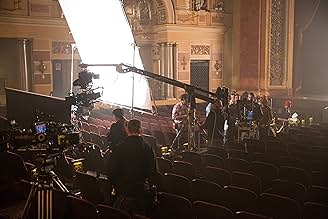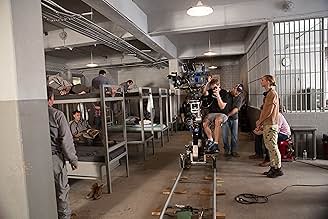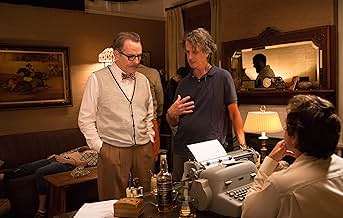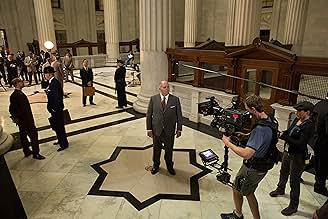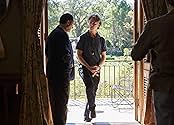En 1947, Dalton Trumbo était le meilleur scénariste d'Hollywood, jusqu'à ce que lui-même et d'autres artistes soient emprisonnés et mis sur liste noire pour leurs convictions politiques.En 1947, Dalton Trumbo était le meilleur scénariste d'Hollywood, jusqu'à ce que lui-même et d'autres artistes soient emprisonnés et mis sur liste noire pour leurs convictions politiques.En 1947, Dalton Trumbo était le meilleur scénariste d'Hollywood, jusqu'à ce que lui-même et d'autres artistes soient emprisonnés et mis sur liste noire pour leurs convictions politiques.
- Réalisation
- Scénario
- Casting principal
- Nommé pour 1 Oscar
- 8 victoires et 45 nominations au total
Toby Nichols
- Chris Trumbo (age 6-10)
- (as Tobias McDowell Nichols)
Avis à la une
All movie fans should recognize the name of Dalton Trumbo. Even if his heyday was a good half-century ago, his actions during one of Hollywood's very darkest periods still have tremendous impact even today. Especially today, for that matter.
Some quick background. You may recall that in World War II, the US and the Soviets were allies but that after the war we became distrustful adversaries. This time was known as the Cold War – since the two countries didn't fight one another – and really ended only in the late 1980s. Prior to the end of WW II, many Americans joined the Communist Party as a way to fight the rise of Fascism in Europe. After the war, current and former members of the Party were looked upon as pariahs of the highest order. Screenwriter Dalton Trumbo (Bryan Cranston) was one of these pariahs. It didn't help that he actively tried to rally technical workers on film sets (grips, lighting and sound technicians) to strike for higher pay. Unionizing was seen as a bad thing, despite the gains it had achieved for American workers earlier in the century.
Trumbo's membership in the Party wasn't a big deal at first, but then gossip columnist Hedda Hopper (Helen Mirren), who wielded an enormous amount of power in Hollywood, took it as a personal affront and used her column (and weekly appearance in newsreels) to denounce Communism in general and Trumbo in particular. Kicking the whole scandal into high gear was a little-known congressional group – the House Un-American Activities Committee. These guys tried to rout out Commies from Hollywood (which it saw as holding a lot of sway over Americans, much more so than today) by calling a group of known or suspected Communists to Washington for sworn testimony. These men were known as the Hollywood Ten. Trumbo was one of them, and he refused to tell the committee the names of anyone else who was or who could be a Communist. He, like his fellow Ten members, was found in contempt. Later, someone not in the group did name Trumbo, and he was put in prison for a full year.
When he got out, no one would hire him (or any of the others in the Ten). Except for King Brothers Studio, which couldn't pay him much. But Trumbo worked fast as both a writer of original stuff and a fixer of existing scripts. The Kings loved him. So much so that the others in the Ten were offered jobs (for no credit, same as Trumbo) working as script doctors. During this time, Trumbo also got work from some friendly sorts in the business by selling them a script but not taking on-screen credit; the credit typically went to a fictitious person, or to a willing accomplice – known as a front. Through this method, Trumbo won two writing Oscars – although no one knew it at the time.
Dalton Trumbo fought for himself, his fellow writers, and for anyone for whom the Bill of Rights holds any meaning. He reasoned that if people could be silenced for political beliefs, then anyone could be silenced for any reason. This is, unfortunately, still true today. And although he didn't receive credit at the time, Trumbo was awarded his Oscars eventually (one posthumously). He's recognized as being one of the very greatest screenwriters the world has ever known. The movie does a terrific job describing Trumbo's struggles – and that of his family: his wife Cleo (Diane Lane) and his three doting children. The toll that his stance took on them was noticeable to everyone except for Trumbo himself.
Cranston turns in what was an Oscar-nominated performance, but his was not the only one of note. Lane is superb as his suffering, strong better half. Elle Fanning, as his eldest daughter, is also a standout, as are John Goodman (as Frank King) and Alan Tudyk (as writer Ian McLellan Hunter). Spellbinding from start to finish, and all screenwriters owe Trumbo a huge debt of gratitude for his long struggle on their behalf.
Some quick background. You may recall that in World War II, the US and the Soviets were allies but that after the war we became distrustful adversaries. This time was known as the Cold War – since the two countries didn't fight one another – and really ended only in the late 1980s. Prior to the end of WW II, many Americans joined the Communist Party as a way to fight the rise of Fascism in Europe. After the war, current and former members of the Party were looked upon as pariahs of the highest order. Screenwriter Dalton Trumbo (Bryan Cranston) was one of these pariahs. It didn't help that he actively tried to rally technical workers on film sets (grips, lighting and sound technicians) to strike for higher pay. Unionizing was seen as a bad thing, despite the gains it had achieved for American workers earlier in the century.
Trumbo's membership in the Party wasn't a big deal at first, but then gossip columnist Hedda Hopper (Helen Mirren), who wielded an enormous amount of power in Hollywood, took it as a personal affront and used her column (and weekly appearance in newsreels) to denounce Communism in general and Trumbo in particular. Kicking the whole scandal into high gear was a little-known congressional group – the House Un-American Activities Committee. These guys tried to rout out Commies from Hollywood (which it saw as holding a lot of sway over Americans, much more so than today) by calling a group of known or suspected Communists to Washington for sworn testimony. These men were known as the Hollywood Ten. Trumbo was one of them, and he refused to tell the committee the names of anyone else who was or who could be a Communist. He, like his fellow Ten members, was found in contempt. Later, someone not in the group did name Trumbo, and he was put in prison for a full year.
When he got out, no one would hire him (or any of the others in the Ten). Except for King Brothers Studio, which couldn't pay him much. But Trumbo worked fast as both a writer of original stuff and a fixer of existing scripts. The Kings loved him. So much so that the others in the Ten were offered jobs (for no credit, same as Trumbo) working as script doctors. During this time, Trumbo also got work from some friendly sorts in the business by selling them a script but not taking on-screen credit; the credit typically went to a fictitious person, or to a willing accomplice – known as a front. Through this method, Trumbo won two writing Oscars – although no one knew it at the time.
Dalton Trumbo fought for himself, his fellow writers, and for anyone for whom the Bill of Rights holds any meaning. He reasoned that if people could be silenced for political beliefs, then anyone could be silenced for any reason. This is, unfortunately, still true today. And although he didn't receive credit at the time, Trumbo was awarded his Oscars eventually (one posthumously). He's recognized as being one of the very greatest screenwriters the world has ever known. The movie does a terrific job describing Trumbo's struggles – and that of his family: his wife Cleo (Diane Lane) and his three doting children. The toll that his stance took on them was noticeable to everyone except for Trumbo himself.
Cranston turns in what was an Oscar-nominated performance, but his was not the only one of note. Lane is superb as his suffering, strong better half. Elle Fanning, as his eldest daughter, is also a standout, as are John Goodman (as Frank King) and Alan Tudyk (as writer Ian McLellan Hunter). Spellbinding from start to finish, and all screenwriters owe Trumbo a huge debt of gratitude for his long struggle on their behalf.
This is a well-made film, despite omitting some uncomfortable truths -- namely that Dalton Trumbo, while rightly fighting for free speech, also collaborated with the government to silence views he opposed.
Still, TRUMBO stands as a powerful indictment of McCarthyism and blacklisting -- one that feels uncannily relevant today. Those who mindlessly champion cancel culture might want to watch this film ... before they find themselves on the wrong end of the next punitive trend.
Still, TRUMBO stands as a powerful indictment of McCarthyism and blacklisting -- one that feels uncannily relevant today. Those who mindlessly champion cancel culture might want to watch this film ... before they find themselves on the wrong end of the next punitive trend.
I have seen so many documentaries about this era. The Hollywood blacklist, McCarthyism.
However, this takes a fresh, personal look at what happened. It shows how folks actually handled this, rather than just the circumstances of the time and newsreels of Congress hearings. How did they do it? This shows the how and when, the risks. Of course, Trumbo captures the full story of the persecution.
Stay to the very end of the film, stay for the credits as some of the clips they show are so meaningful.
I don't know if Trumbo was the person shown in the film, but if he was, he was an American hero. I think films like this represent the spirit, the best or worst of the spirit of what happened.
Trumbo wasn't just a hero from the look of it, he was also a survivor who made his way through the worst of it and came out on the other side.
However, this takes a fresh, personal look at what happened. It shows how folks actually handled this, rather than just the circumstances of the time and newsreels of Congress hearings. How did they do it? This shows the how and when, the risks. Of course, Trumbo captures the full story of the persecution.
Stay to the very end of the film, stay for the credits as some of the clips they show are so meaningful.
I don't know if Trumbo was the person shown in the film, but if he was, he was an American hero. I think films like this represent the spirit, the best or worst of the spirit of what happened.
Trumbo wasn't just a hero from the look of it, he was also a survivor who made his way through the worst of it and came out on the other side.
I give this movie an 8 out of 10. I think, technically, it deserves a 6 or 7. It hinges on the modern notion that a biopic isn't complete unless we see all the nuances regarding the protagonist's family life. That is not necessarily the fault of the filmmakers. I don't think a picture can get funded if it doesn't adhere to these modern foibles. I give it an 8, however, and, for its purpose alone, it deserves a 10.
It takes guts to make a movie like this today.
In the United States, we tend to get comfortable and forget that the concept of freedom of speech is the most important idea any human being has ever put forth. We tend to forget that the powers that be don't like that idea.
They really, REALLY don't like that idea.
They want us lowly masses to be good little sheep and do what we're told and think exactly the way they want us to think. We tend to forget that fighting against that tendency of power is a struggle, a painful, sometimes lethal struggle. Folks in other countries know about it. They know all too well. That's why, in spite of all the other problems they may have with the U.S., they still want to live here.
But we've gotten lazy. Not only are there forces on the extreme right that would like to dictate how we live, think, and even breathe--now we have a warring faction from the left, seen most prominently on college campuses, that embraces censorship and the "shutting down" of alternative opinions like little McCarthys on methamphetamine. The concept of a "safe space," where no "offensive" opinions may be heard, is nothing short of censorship. Defenders of this nonsense often make the claim that the government is not getting involved, therefore, it's not a violation of the First Amendment. Here's what's wrong with that argument:
1. Remember our old friend Katherine Hepburn in Adam's Rib? In her closing arguments, she says the law has two parts--the letter and the spirit. It's true, by the letter of the law, students harassing and banning speakers on campus they don't agree with does not equal the federal government censoring those speakers. But it does violate the SPIRIT of the First Amendment. The government, as the film Trumbo clearly shows, cannot always be trusted to safeguard the LETTER of that particular law. It is up to us, We the People, to safeguard the SPIRIT of that law.
2. Trumbo shows us the horrific world where the government trampled on the First Amendment from the top down. What is happening on college campuses today is that violators of what is deemed "politically correct" (a phrase originating from Mao's Cultural Revolution, which should raise several alarms on that basis alone) are subjected to kangaroo courts on the campus, away from legitimate, LEGAL courts of law. They are harassed and humiliated (just as dissenters in the Cultural Revolution were) with no legal recourse. If this practice becomes accepted in normal society, we will have a political environment no different from the times depicted in the film. The only difference--this time, it we have started with the people and spread to a government ready and willing to enact "speech codes" for its own purposes.
By now, those who still, stubbornly, cling to the notion that there is nothing wrong with what is happening on college campuses today will have dismissed this review. They might even leave typical ad hominem attacks on the message boards to make what attempts they can to silence me (to kill the messenger, if you will). This should very well indicate that what I've said is true.
The sane people reading this, no doubt, are asking what the heck this all has to do with Trumbo.
Answer:
Everything.
Having been subjected to a kangaroo court on a college campus where I was called in to the Title IX office for teaching Vonnegut's "Harrison Bergeron," I couldn't help but think, as I watched Trumbo, of the horrific witch hunt I was subjected to. That the film so easily earned my empathy is a testament to how well it's made.
I wish everyone involved a long, healthy career in the movies. We need more stories like this, stories that remind us the struggle to survive as individuals in a world that so stubbornly clings to collectivism is a never-ending battle. It's happened before. It's happening now. If we don't speak up and resist, it will continue happening in the future.
It takes guts to make a movie like this today.
In the United States, we tend to get comfortable and forget that the concept of freedom of speech is the most important idea any human being has ever put forth. We tend to forget that the powers that be don't like that idea.
They really, REALLY don't like that idea.
They want us lowly masses to be good little sheep and do what we're told and think exactly the way they want us to think. We tend to forget that fighting against that tendency of power is a struggle, a painful, sometimes lethal struggle. Folks in other countries know about it. They know all too well. That's why, in spite of all the other problems they may have with the U.S., they still want to live here.
But we've gotten lazy. Not only are there forces on the extreme right that would like to dictate how we live, think, and even breathe--now we have a warring faction from the left, seen most prominently on college campuses, that embraces censorship and the "shutting down" of alternative opinions like little McCarthys on methamphetamine. The concept of a "safe space," where no "offensive" opinions may be heard, is nothing short of censorship. Defenders of this nonsense often make the claim that the government is not getting involved, therefore, it's not a violation of the First Amendment. Here's what's wrong with that argument:
1. Remember our old friend Katherine Hepburn in Adam's Rib? In her closing arguments, she says the law has two parts--the letter and the spirit. It's true, by the letter of the law, students harassing and banning speakers on campus they don't agree with does not equal the federal government censoring those speakers. But it does violate the SPIRIT of the First Amendment. The government, as the film Trumbo clearly shows, cannot always be trusted to safeguard the LETTER of that particular law. It is up to us, We the People, to safeguard the SPIRIT of that law.
2. Trumbo shows us the horrific world where the government trampled on the First Amendment from the top down. What is happening on college campuses today is that violators of what is deemed "politically correct" (a phrase originating from Mao's Cultural Revolution, which should raise several alarms on that basis alone) are subjected to kangaroo courts on the campus, away from legitimate, LEGAL courts of law. They are harassed and humiliated (just as dissenters in the Cultural Revolution were) with no legal recourse. If this practice becomes accepted in normal society, we will have a political environment no different from the times depicted in the film. The only difference--this time, it we have started with the people and spread to a government ready and willing to enact "speech codes" for its own purposes.
By now, those who still, stubbornly, cling to the notion that there is nothing wrong with what is happening on college campuses today will have dismissed this review. They might even leave typical ad hominem attacks on the message boards to make what attempts they can to silence me (to kill the messenger, if you will). This should very well indicate that what I've said is true.
The sane people reading this, no doubt, are asking what the heck this all has to do with Trumbo.
Answer:
Everything.
Having been subjected to a kangaroo court on a college campus where I was called in to the Title IX office for teaching Vonnegut's "Harrison Bergeron," I couldn't help but think, as I watched Trumbo, of the horrific witch hunt I was subjected to. That the film so easily earned my empathy is a testament to how well it's made.
I wish everyone involved a long, healthy career in the movies. We need more stories like this, stories that remind us the struggle to survive as individuals in a world that so stubbornly clings to collectivism is a never-ending battle. It's happened before. It's happening now. If we don't speak up and resist, it will continue happening in the future.
9vsks
After practically having the frequently shown previews for Trumbo memorized, I finally saw the film itself. (Though one trailer scene with Helen Mirren didn't actually appear in the movie. Weird.) As you undoubtedly know, Trumbo is the story of the Hollywood 10, writers blacklisted during the communist witch-hunts of the late 1940s and 1950s. Joe McCarthy and all that. When called before the House Un-American Activities Committee, Dalton Trumbo (played beautifully by Bryan Cranston) and the other nine refused to give Congress information about their beliefs or to rat out others in the film industry. As a result, a number of them including Trumbo went to prison for contempt of Congress ("I AM contemptuous of Congress," he said after the HUAC hearing). He was in the slammer for 10 months and once he was out could no longer get work. Meanwhile, some industry personages—in the movie, producer Buddy Ross (Roger Bart) and actor Edward G. Robinson (Michael Stuhlbarg)—saw their careers going up in smoke and did testify (though in real life, Robinson did not name names). The movie effectively skewers that Great American Flag-Waving Hero, John Wayne, who managed to avoid any military service during World War II and Korea. "If you're going to act as if you won the war single-handedly," Trumbo tells him, "it would be more believable if you'd actually served," as he and so many of his black-listed colleagues had. They represent the tip of the iceberg of people harmed by the virulent anti-Communism of the day, and although the movie is about the Hollywood 10, it's really about the Hollywood One, Trumbo, the most accomplished of the lot. The composite character Arlen Hird has the unenviable job of being Trumbo's verbal sparring partner and representing an amalgam of several of the harder-line writers' views. Trumbo is unfailingly supportive of him, even though he inserts his political views into scripts (which Trumbo rewrites) and clearly doesn't trust Trumbo. (This is where the "You talk like a radical, but you live like a rich man" line from the trailer fits in.) While not a lot of acting was required of Diane Lane as Trumbo's wife, she did a fine job, and Helen Mirren is perfect as the odious Hedda Hopper, blackmailer without portfolio. As writer Hird, comedian Louis C.K.'s acting inexperience shows a bit, as he's up against such acting superstars, while John Goodman is all prickly geniality and Alan Tudyk plays a credible Ian McLellan Hunter. Hunter wins the Academy Award for the Roman Holiday script (the Gregory Peck, Audrey Hepburn classic), but Trumbo wrote it. In fact, Trumbo and the others write many screenplays for which they receive credit only belatedly, if at all. The back of the blacklist can't be broken until a few Hollywood luminaries are willing to give appropriate screen credit. Directed by Jay Roach with a solid script from John McNamara. While in their vision, the character of Trumbo doesn't change much over the course of the story—except perhaps to learn not to take what he most cherishes for granted—"he is no more or less principled at the end than he was at the start," said Anthony Lane in The New Yorker. He is forgiving, though, and in the end acknowledges that all humans are a mix of good acts and bad (except perhaps for Hedda Hopper). The real opportunity for learning lies with the audience. While those anti-Communist days may now seem rather quaint—Congress taking on a bunch of two-fingered typists—there always are people who believe they know best what other people should think, who believe others are too dim or inattentive to grasp hidden political messages, who think citizens are like children who have to be protected from difficult ideas. That, the movie Trumbo seems to say, is still the danger. Another film well worth the price of a ticket.
Le saviez-vous
- AnecdotesBryan Cranston revealed in a radio interview that Kirk Douglas approved of this movie, but his major complaint was that he wasn't asked to play himself.
- GaffesWhen the Oscar is presented for Best Screenplay at the 1954 Awards the presenter says, "And the Oscar goes to..." This phrase was not used by presenters until the 61st Academy Awards in 1989. In the 1950s the presenter would have said, "And the winner is..." when presenting an Oscar.
- Citations
Dalton Trumbo: Friends? What friends? Who the hell has the luxury of friends? I've got allies and enemies. There's no room for anything else.
- Crédits fousAs the credit scroll begins, photos of Dalton Trumbo, his family, and other people portrayed in the film are shown. These are followed by historical footage of Trumbo giving an interview (from the same one where he acknowledges that he is 'Robert Rich').
- Versions alternativesThe version of the movie that has been screened on Indian theaters and telecast in India is a PG-13 level cut that has been rated UA by the CBFC.
Meilleurs choix
Connectez-vous pour évaluer et suivre la liste de favoris afin de recevoir des recommandations personnalisées
Détails
Box-office
- Budget
- 15 000 000 $US (estimé)
- Montant brut aux États-Unis et au Canada
- 7 857 741 $US
- Week-end de sortie aux États-Unis et au Canada
- 74 177 $US
- 8 nov. 2015
- Montant brut mondial
- 11 430 025 $US
- Durée2 heures 4 minutes
- Couleur
- Mixage
- Rapport de forme
- 1.85 : 1
Contribuer à cette page
Suggérer une modification ou ajouter du contenu manquant









